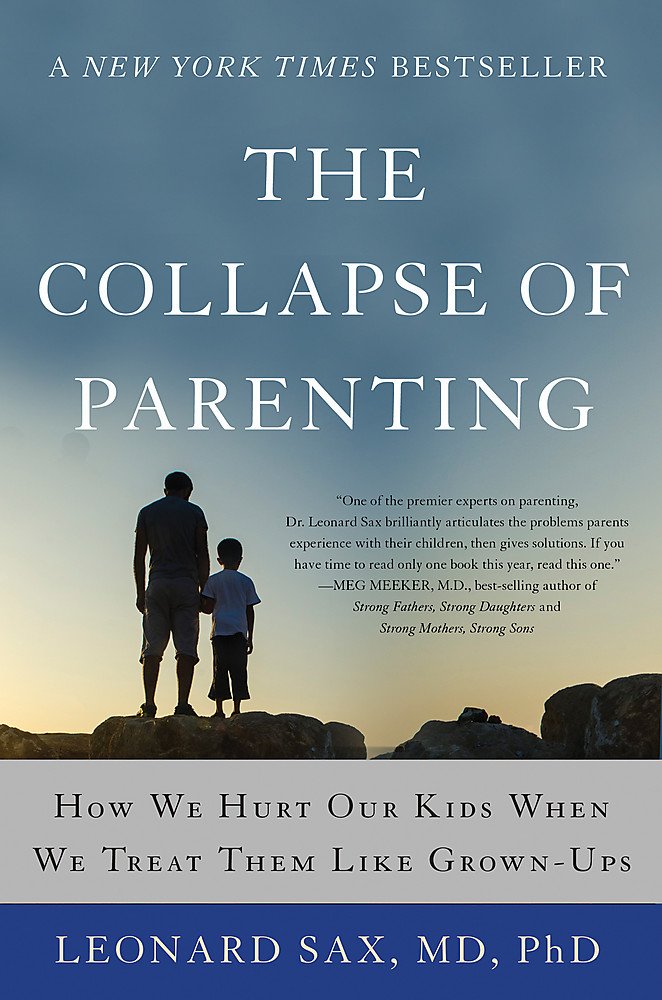
Author: Leonard Sax
Published: 2015
Goodreads: 4.3/5
Amazon: 4.7/5
(Jul 2020)
The Collapse Of Parenting, written by Leonard Sax is a relatively new publication that has been gathering a lot of attention lately. The popularity of this book seems to not only come from the agrees but also from arguments around its controversial reasoning.
Throughout the book, the author criticizes the way how millions of parents in the United States treat their children. According to him, 50 years ago, the teachers were responsible for teaching pupils how to behave. Today, while schools are trying to compete with each other on academic aspects, the work of behavior training is shifted to the parents. To be worse, this transfer of responsibility coincides with the change in adults’ minds, that the adults of today become more lenient, they tend to let their offspring do whatever they want as that is what they call “freedom”. The consequence is that these modern kids grow into ungrateful, insolent, unrealistic (and loads of other dreadful adjectives).
From Leonard’s 30 years of experience working directly with families in the US and around the world, he observes that many moms and dads, especially in North America, have lost their role as a parent, and this phenomenon is becoming the norm of the society. Adults now have less power in the eyes of the youngsters. Infants and teens care much more about how their peers, of the same age, think about them than about how their parents do. When something is wrong, a child will not seek advice from the grown-ups, but rather from their friends, who are, unfortunately, not that qualified and wise to give guidance.
Gradually, this unnatural discrepancy would make bad consequences on the development of those children. As the statistics pointed out, the obesity rate and ADHD (Attention Deficit Hyperactivity Disorder) rate have risen, while the exercise capacity and creativity substantially fell. Moreover, these numbers got even worse when those once-children grew into the age of adolescence and middle age. They don’t improve when they grow up, they get more awful.
To say more about the creativity, while many believe that letting children decide on their own is a necessity of building their creativity, Leonard sees the opposite. According to recorded data, the time when the Americans are the most creative was in the past, when youngsters know how to be polite and respect the elders. In the last 2 decades, creativity has declined together with the rise of ungratefulness.
While part 1 of the book is dedicated to present the problem and its severity, Leonard uses the second part to demonstrate how things can be resolved with solutions. He enumerates and demonstrates the three main things parents should teach to have children with happiness, wealth, and health both in childhood and their future adult lives: to be humble, to enjoy, and to realize the meaning of life.
Half of being humble is to respect others, especially adults, while the other half is to know their limits and stop pushing on what is not meant for them. The second concept seems to contradict conventional wisdom. Instead of “stand up where you fall”, Leonard suggests to move to another place where you have the most power and potential, and stand up there. Actually, the author does not mean to discourage children (and generally, people) from being courageous, rather, he demands a higher level of self-awareness, to know oneself’s strengths and weaknesses to spend energy in the right direction.
To enjoy means to take time to live slowly, get some breaks from studying (children) and working (parents) to spend time and share feelings with your family. Family members need to be connected, they should be the closest to each other. Children need to have bonds with their parents and parents are responsible for making sure that those bonds exist.
Lastly, it is normal for different people to have different meanings of life, however, as children are willing to take guidance from their peers but not from the adults, they either have no thoughts of what is important in life or obtain distorted believes that can potentially ruin their own lives and even have bad effects on others’. Giving advice and sharing experience to guide the smalls is the perpetual duty of the elders.
To conclude, Leonard did not forget to warn that the needed changes of the parents are indeed hard to make, peculiarly when they go against the common norms of the society. Nevertheless, those are necessary. Parents, sometimes, have to take the hard choice to do the right things, even if that would make the children discomfort and protest.
My final thoughts
In terms of scope, although the book mostly mentions and targets the context of the United States, I think the problems might occur everywhere, including the developing countries where many people like to copycat what the Americans do. For that reason, this book is equally suitable for every one of us, we are not “safe” just because we are not living in the USA.
In terms of ideas and reasoning, the book presents and explains some arguments that appear to be counter-intuitive at first, however, if we think of it up close, we see that they just complement, but do not oppose what has been agreed so far in good parenting.
Overall, I have had a good time reading this book. Even though I don’t think that this book is my bible for parenting, I consider it as a good additional piece. If you are going to read only one book, I would not suggest this one. However, if you have read quite a few books that mention treating children with respect, The Collapse of Parenting might be a good complement.
The book: The Collapse of Parenting: How We Hurt Our Kids When We Treat Them Like Grown-Ups by Leonard Sax